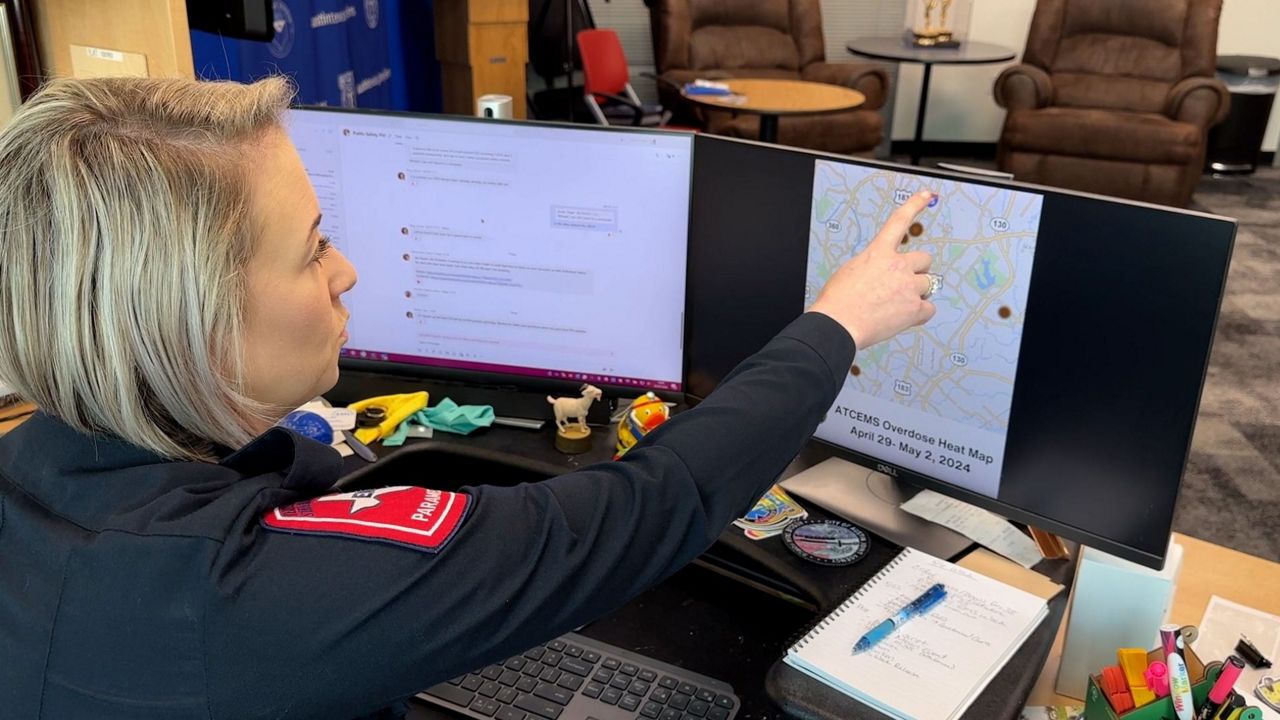Pennsylvania
AARP Pennsylvania turns the tables on con artists in ‘Reverse Boiler Room’

PHILADELPHIA, May 19, 2023 /PRNewswire/ — AARP Pennsylvania volunteers lit up the phone lines today as part of a “Reverse Boiler Room,” dialing thousands of older Pennsylvanians to arm them with the information they need so they can be on the alert and protect themselves and their families from certain scams.
They were joined by U.S. Senator Bob Casey, Pennsylvania’s Secretary of Aging Jason Kavulich, and Acting Secretary of Human Services Valerie Arkoosh in reversing a long-time favorite tactic of con artists, whereby instead of hearing from crooks, Pennsylvania residents heard from trained volunteers on how to protect themselves from fraud and identity theft.
“Every year, more and more Pennsylvanians are victimized by fraudsters and scammers,” said Bill Johnston-Walsh, state director of AARP Pennsylvania. “And, once the money is gone, it is nearly impossible to recover. The best defense is for people to be informed about the various forms of consumer fraud happening daily – whether over the phone, the internet, your email, your mailbox, or even at your front door. That is why today we turned the tables on scammers, arming Pennsylvanians with the information they need so they know how to spot a scam and stop a scam.”
Impostor scams generally start with an unsolicited phone call, email, text or social media message. Fraudsters impersonate people and organizations you would ordinarily trust or at least hear out. The most common pose, accounting for 40 percent of impostor reports to the FTC, involves government agencies such as Social Security, Medicare or the IRS.
Impersonating police officers, federal agents, the IRS, tech, online shopping, or financial service companies, scammers use their “authority” to scare a person into paying them. Or they pretend to be a friend or loved one in trouble who needs money.
“Today, I was grateful to join AARP in Philadelphia to ensure Pennsylvania seniors know every tool at their disposal to prevent unscrupulous actors from stealing their hard-earned savings. This includes the Aging Committee’s annual Fraud Book, a valuable resource with information about the most common scams that seniors report to the Committee’s Fraud Hotline, and how best to prevent them. One of my top priorities in Congress is protecting older adults against frauds and scams, and I’ll keep working to make sure seniors stay protected,” said Senator Casey, Chairman of the U.S. Senate Special Committee on Aging.
“I am pleased to stand today with Senator Casey, Acting Secretary Arkoosh and other public servants and advocates who have done so much important work in the area of fraud and scams prevention,” said Secretary of Aging Jason Kavulich. “Indeed, to protect older adults and their significant assets, we must form a united front to make sure they have the information they need to prevent themselves from being exploited. We must work to share information and resources across systems; the information gaps are where scammers can flourish. I applaud Bill Johnston-Walsh, Teresa Osborne and all the fine advocates at AARP for creating an event that shines a light on a favorite scamming tactic and empowers older adults to fight back.”
“The Department of Human Services administers programs that provide life-sustaining supports – essentials like food, health care, and more. These are core to our daily wellbeing, and unfortunately, can be a subject for people looking to scam others,” said DHS Acting Secretary Val Arkoosh. “Please know that DHS will never text or call looking for personal information, and any outreach from my agency will direct Pennsylvanians to update their case through official channels like our COMPASS website. If you receive assistance through DHS, please stay vigilant to protect yourselves and these critical services.”
The AARP Fraud Watch Network is a free resource for all. Fraud Watch equips consumers with up-to-date knowledge to spot and avoid scams and connect those targeted by scams with our fraud helpline specialists, who provide support and guidance on what to do next. AARP also advocates at the federal, state, and local levels to enact policy changes that protect consumers and enforce laws.
The event was hosted by Benefits Data Trust, a Philadelphia-based nonprofit that provides assistance over the phone to help tens of thousands of older Pennsylvanians apply for low-cost prescription drugs and other critical support.
To report a scam, please call local law enforcement. For help from AARP, call 1-877-908-3360 or visit the AARP Fraud Watch Network at www.aarp.org/fraudwatchnetwork.
About AARP
AARP is the nation’s largest nonprofit, nonpartisan organization dedicated to empowering people 50 and older to choose how they live as they age. With a nationwide presence and nearly 38 million members, AARP strengthens communities and advocates for what matters most to families: health security, financial stability and personal fulfillment. AARP also produces the nation’s largest circulation publications: AARP The Magazine and AARP Bulletin. To learn more, visit www.aarp.org, www.aarp.org/espanol or follow @AARP, @AARPenEspanol, @AARPadvocates and @AliadosAdelante on social media.
Contact: TJ Thiessen, [email protected], 202-374-8033
SOURCE AARP Pennsylvania

Pennsylvania
UPenn anti-Israel protesters arrested after attempt to occupy building, police say

Several anti-Israel agitators were arrested at the University of Pennsylvania on Friday night after hundreds of protesters descended into a campus building and attempted to occupy it.
Police confirmed to Fox News Digital that there were multiple arrests at the university’s Fisher Bennett Hall on Friday night. It is unknown at this time how many were arrested.
The UPenn Police Department announced in a community notice that a “large disorderly crowd” began gathering at 8 p.m. on Friday, and moved into Fisher Bennett Hall on the university’s campus and attempted to occupy it.
Law enforcement advised students to “avoid the immediate area.”
BLACK STUDENT ERUPTS ON ANTI-ISRAEL ‘WHITE LIBS’ FOR BLOCKING PATH ON CAMPUS: ‘COSPLAYING AS THE OPPRESSED’
Pro-Palestinian protestors stage an encampment at the University of Pennsylvania in Philadelphia, Pennsylvania, United States April 25, 2024. (Getty Images)
Campus police, along with assistance from the Philadelphia Police Department, escorted the protesters from the campus building.
POLICE ON UC IRVINE CAMPUS AFTER ANTI-ISRAEL AGITATORS SWARM BUILDINGS; STUDENTS TOLD TO ‘LEAVE AREA’
In an 11 p.m. update, authorities said that the protesters had dispersed.

An anti-Israel encampment is removed Friday at the University of Pennsylvania campus in Philadelphia. (WTXF)
The occupation came one week after police dismantled an encampment that had taken over part of the Ivy League’s campus for two weeks.
CLICK TO GET THE FOX NEWS APP
In a statement, members of the Penn Gaza Solidarity Encampment accused the University of Penn administration of not negotiating with them in good faith over “Penn’s investment with Israel.”
Pennsylvania
Pennsylvania man accused of murdering roommate, scattering body parts in 3 locations

SLATINGTON, Pa. (CBS) — A Pennsylvania man was arrested after state police said they found his roommate’s body scattered in three locations, including a trail, a cemetery and a quarry.
Police said 37-year-old David Hittinger’s dismembered body was discovered in Slatington, just 15 miles north of Allentown, Pennsylvania.
The concern for Hittinger began Monday when a friend called state police.
“It was unusual that they had not heard from him in that period of time, [they] expected to hear from him.” Lehigh County District Attorney Gavin Holihan said. “It was his birthday.”
That call led to a search the following day of 33-year-old Joshua Moser’s home, where investigators said Hittinger recently moved in as a roommate.
“As a result of that search warrant,” Holihan said. “Blood, hair, and other evidence were found in the basement of that home.”
Holihan said, on Wednesday, investigators found more evidence in the home.
“Items that were recovered included a saw, a boxcutter, more evidence of blood, including bloody clothing,” Holihan said.
Authorities found Moser in Monroe County where he was taken into custody on a parole violation. He pleaded guilty in a fatal DUI crash in 2016.
“Later that evening, the discovery was made at the Fairview Cemetery in Slatington,” Holihan said. “That discovery was physical evidence. That physical evidence included body parts, dismembered body parts of David Hittinger.”
The criminal complaint says Moser has admitted to the crime. Investigators did not release a motive.
Pennsylvania
Pa.’s judges must reveal the perks they accept, but the public won’t find those disclosures online

This story originally appeared on Spotlight PA.
Every year, thousands of officials in state government must fill out reports by May 1 that disclose their sources of income, creditors, and business interests, as well as any gifts, hospitality, or other perks they accepted.
Those reports, called statements of financial interest, are then made publicly searchable and available online. The forms are a key way for the public to gain a deeper understanding of their elected officials’ financial ties, as well as discover which outside groups may be trying to influence public policy decisions.
Pennsylvania’s judges, however, play by somewhat different rules.
Though they too must file annual disclosures, theirs aren’t posted online. The public must ask for copies — provided they know where to go for that information.
Some good-government advocates say this creates an unnecessary inconvenience for anyone trying to quickly access fundamental information about Pennsylvania’s judiciary, a critical branch of government with great power over civil and criminal matters.
“Judges are public officials, and there are many special interests trying to influence the courts,” said Michael Pollack, executive director of March On Harrisburg, a group that pushes for transparency in government, as well as a ban on gifts to elected officials.
“When you erect barriers, you are denying access,” he said.
Stacey Witalec, spokesperson for the Administrative Office of Pennsylvania Courts, did not answer a question about why the courts do not post financial interest statements for judges online. “While not posted on our website, the Court makes the statements of financial interest available upon request,” she said in an email.
She did not elaborate.
Statements of financial interest are at their core a tool to increase public trust in government. But they also can act as deterrents, the thinking being that disclosure makes it less likely a public official will engage in any conflicts of interest. The importance of a robust reporting system was amplified following media investigations last year that revealed several U.S. Supreme Court justices had not disclosed certain gifts and travel.
-

 World1 week ago
World1 week agoPentagon chief confirms US pause on weapons shipment to Israel
-

 Politics1 week ago
Politics1 week agoRFK Jr said a worm ate part of his brain and died in his head
-

 Politics1 week ago
Politics1 week agoOhio AG defends letter warning 'woke' masked anti-Israel protesters they face prison time: 'We have a society'
-

 News1 week ago
News1 week agoNine Things We Learned From TikTok’s Lawsuit Against The US Government
-

 Politics1 week ago
Politics1 week agoBiden’s decision to pull Israel weapons shipment kept quiet until after Holocaust remembrance address: report
-

 Education1 week ago
Education1 week agoVideo: Police Use Pepper Spray on Protesters on G.W.U.’s Campus
-

 World1 week ago
World1 week agoA look at Chinese investment within Hungary
-

 News1 week ago
News1 week agoThe Major Supreme Court Cases of 2024









![Pietro Beccari: ‘There is no household in the world that doesn’t have [contact with] Louis Vuitton’](https://www.ft.com/__origami/service/image/v2/images/raw/https%3A%2F%2Fwww.ft.com%2F__origami%2Fservice%2Fimage%2Fv2%2Fimages%2Fraw%2Fhttps%253A%252F%252Fd1e00ek4ebabms.cloudfront.net%252Fproduction%252Fb68a5c6a-f6ef-40c7-8c6c-ce8d9b288cee.jpg%3Fsource%3Dnext-article%26fit%3Dscale-down%26quality%3Dhighest%26width%3D700%26dpr%3D1?source=next-opengraph&fit=scale-down&width=900)










